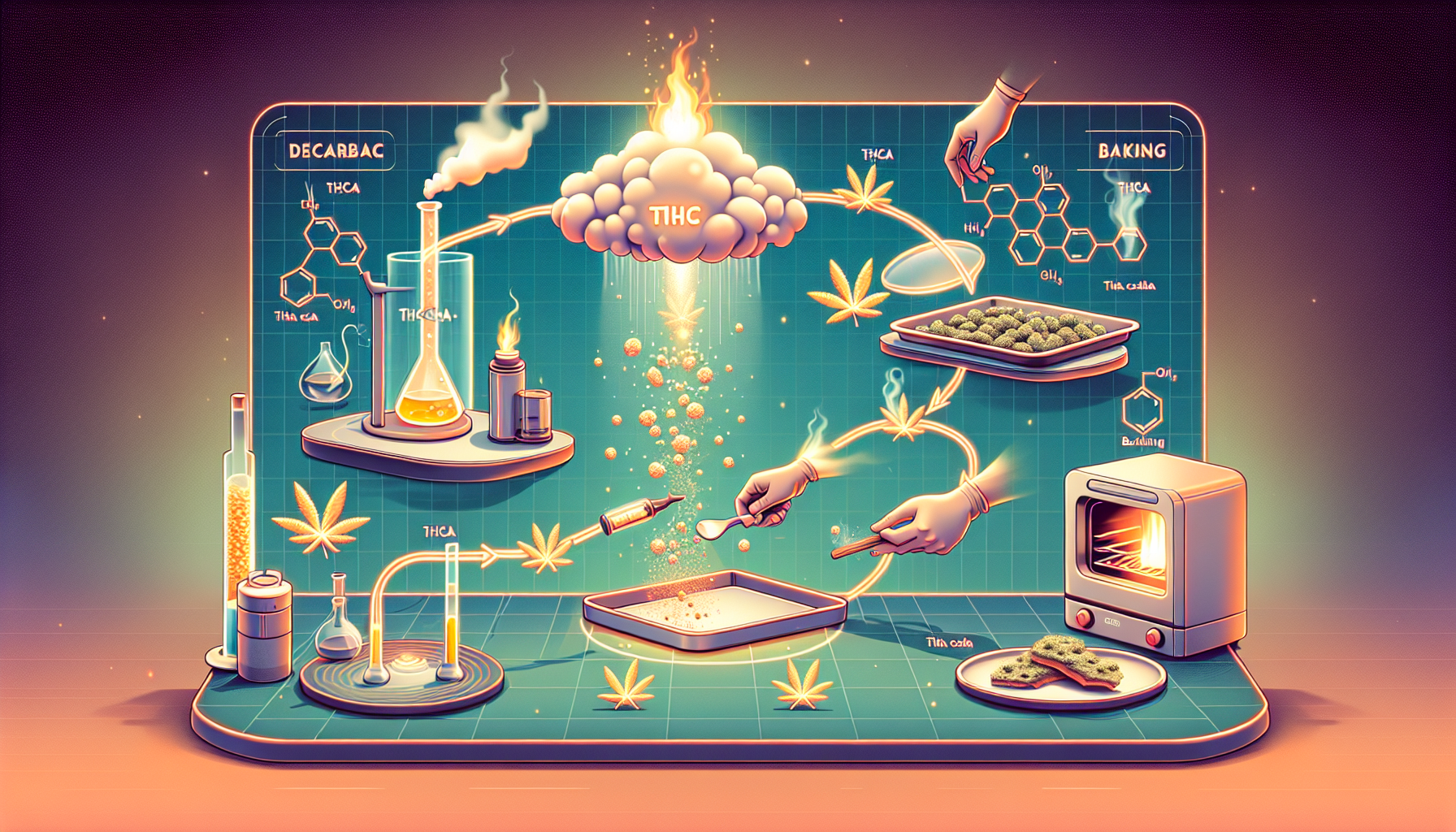THCA, present in raw cannabis, does not induce the psychoactive effects that THC is known for because it lacks the ability to get you high unless subjected to decarboxylation—a process that converts THCA into THC. This discussion will delve into the distinctions between THCA and THC, how THCA transforms through decarboxylation, and the possible advantages this compound may offer.
Key Takeaways
- THCA won’t get you high unless it undergoes the decarboxylation process, turning into THC when heated. So, raw cannabis salads are safe from euphoria overload.
- Smoking or vaping THCA can convert it into THC, giving you the full psychoactive effects. Basically, you’re turning your mild-mannered THCA into a rock star.
- THCA has therapeutic properties like being anti-inflammatory, antiemetic, and neuroprotective, making it a health hero despite its non-intoxicating nature.
Does THCA Get You High? Discover the Truth
To tackle the pivotal question: Does THCA induce intoxication? The answer is a resounding no. Present in great quantities within raw cannabis plants, raw THCA stands as ineffective at eliciting any psychoactive sensations as a soothing cup of warm milk does before sleep. Without undergoing decarboxylation, a specific transformation process requiring heat, THCA remains similar to the discreet and unremarkable persona of Clark Kent—undisturbed until exposed to sufficient warmth.
If your diet includes fresh-off-the-stem cannabis buds or you garnish your salad with them, don’t expect to experience any high since these contain raw THCA—a compound that’s inactive by nature. To unlock its potent counterpart THC—the source behind the celebrated high—one must activate it through heating, which catalyzes the conversion from non-intoxicating THCA.
Introduction
The therapeutic benefits of THCA and its unique relationship with THC are gaining increased recognition. Being the non-psychoactive antecedent to THC, THCA doesn’t attract as much attention until it undergoes decarboxylation through heat exposure, creating a legal loophole in regions where marijuana remains prohibited. This article delves into the nature of THCA, how it transforms into THC upon heating, and its growing promise within the realm of medicine.
With the expiration of the 2018 Farm Bill casting uncertainty over hemp-derived cannabinoids’ legality, we anticipate more research and revisions in regulatory frameworks. Whether your interest lies in unlocking THCA’s health benefits or keeping abreast with evolving legal stipulations—this comprehensive examination will touch on everything from central nervous system effects to variations in plant material handling.
What is THCA?
Tetrahydrocannabinolic acid, or THCA for short, is a compound found within the thca flower of cannabis plants. In its raw form, THCA does not cause any psychoactive effects because it’s a non-intoxicating cannabinoid that hasn’t been converted into THC—the main psychoactive component in cannabis. Consuming raw THCA means you’re experiencing the substance in its natural state without the usual high associated with THC.
In fresh and unprocessed cannabis buds lies an abundance of THCA, which is essentially a non-psychoactive version of the more well-known psychoactive compound. It’s important to note that when consuming raw cannabis containing a high percentage of this precursor chemical, no intoxicating effects will be felt as long as heat isn’t introduced to transform it into THC—a process known as decarboxylation—maintaining its original status as an inactive but naturally occurring cannabinoid in the plant.
How Does THCA Become THC?
The process by which THCA is converted into THC, known as decarboxylation, involves the application of heat. This chemical reaction converts the non-psychoactive precursor THDA into a substance with psychoactive effects, THC. Various methods can induce this transformation, including:
- lighting up
- vaporizing
- applying concentrated heat (dabbing)
- cooking
- even exposure to sunlight over time.
When you ignite a joint, what unfolds is essentially a miniaturized scientific experiment taking place right in your hands.
By smoking THCA-rich cannabis material, one initiates its conversion through decarboxylation to yield THC — the compound responsible for marijuana’s mind-altering properties. The outcome? A powerful experience that can elicit intense feelings of joy and relaxation or possibly hallucinogenic effects depending on how much is consumed and individual sensitivity levels. It’s analogous to heating transforming an unassuming librarian into an electrifying rock star!

Does Consuming Raw THCA Get You High?
Eating raw cannabis buds or adding them to a smoothie as a source of raw THCA will not induce psychoactive effects. The inactive compounds present in the natural state of THCA do not interact with brain receptors like its counterpart THC, enabling consumption of raw cannabis without experiencing intoxication.
Since THCA is structurally incapable of binding to CB1 receptors in our brains, it does not produce euphoric sensations. This scenario can be likened to having an incompatible key for a lock. No matter the effort expended, it simply won’t unlock feelings of highness. Feel free to consume your raw THCA as part of your diet just like any other raw food supplement without concern for mind-altering consequences.
Does Smoking THCA Get You High?
Discussing the impact of smoking THCA, it’s important to note that when subjected to heat as in smoking, THCA is transformed into THC through a process known as decarboxylation. This alteration turns THCA into a psychoactive compound capable of eliciting euphoric and intoxicating sensations—essentially, it’s the coming-of-age for THCA.
As you inhale or smoke THCA, you are essentially converting it into its psychoactive counterpart, THC. This transition tends to bring forth an intense high rather swiftly. The experience usually involves classic cannabis effects like changed perceptions and a deep sense of relaxation. If achieving a heightened state is your goal, then indeed smoking THCA will serve that purpose effectively.
THCA vs. Regular Weed: Psychoactive Effects
Comparing THCA in its raw state to traditional cannabis is like contrasting uncooked apples with a cooked apple pie. In its natural, untouched form, THCA does not have psychoactive properties and will not cause any intoxicating effects. Yet when you apply heat through smoking, vaporizing, or cooking—known as the decarb process—the non-psychoactive raw THCA converts into Delta 9 THC, the well-known substance that produces feelings of euphoria.
In contrast to its raw counterpart which contains non-psychoactive cannabinoids like raw THCA, regular marijuana comes loaded with activated THC that brings about the quintessential high characterized by sensations of blissfulness and relaxation and may even lead to visual distortions at times. This difference is similar to enjoying simple grape juice versus savoring an aged wine. Both originate from grapes yet offer distinct experiences due partly to their fermentation status.
Potential Therapeutic Benefits of THCA
THCA, despite not producing intoxicating effects, is rich in potential therapeutic benefits. This non-intoxicating cannabinoid offers a variety of medical potentials. Notably, its neuroprotective properties may be beneficial for the treatment of neurodegenerative diseases such as Parkinson’s disease, providing protection to brain cells without inducing psychoactive effects.
THCA has demonstrated several advantageous attributes.
- It exhibits anti-inflammatory qualities that could be instrumental in tackling chronic inflammation.
- Its antiemetic property can help alleviate nausea and vomiting—this is particularly helpful for patients undergoing chemotherapy treatments.
- Early research suggests that THG might have anti-tumor capabilities which could potentially contribute to the inhibition of certain cancer cell growths.
Thus, while lacking euphoric traits, THCA stands out as a guardian of health with substantial therapeutic merit.
Legal Status of THCA
Navigating the legality of THCA can be quite intricate and perplexing. Here are essential points to consider about the legal status of THCA:
- At the federal level, it is legal if extracted from hemp that contains under 0.3% Delta 9 THC.
- Nonetheless, laws at the state level can differ considerably.
Before you engage in using or distributing products containing THCA, understanding your jurisdiction’s particular legislation and guidelines is critical.
Can THCA Show Up on a Drug Test?
It’s frequently asked if a drug test can identify THCA. Most standard drug tests are formulated to search for THC and its byproducts, rather than directly detecting THC. Nevertheless, certain assays may have cross-reactivity that could yield false positives when it comes to THCA presence. Even though you might think there wouldn’t be an issue, there remains a minor chance of receiving an unexpected testing outcome.
Drug screenings often utilize urine tests designed specifically to detect THC-COOH – the breakdown product of THC. The duration that THCA can be traced in your system is influenced by factors like the amount consumed, how it was ingested, and personal metabolic rates. Consequently, understanding how consumption of THCA potentially affects detection on different drug tests is prudent for anyone who has used this substance.
How to Consume THCA Without Getting High
There are multiple strategies to reap the advantages of THCA without the intoxicating high. By taking THCA tinctures under the tongue, you can bypass any mind-altering effects. This provides an easy approach to appreciate THCA without having to smoke or ingest it.
THCA also lends itself well to topical use in creams and ointments, delivering targeted relief while ensuring there’s no psychoactive impact on your state of consciousness. For those who favor precision and manageability in their intake, capsules containing measured amounts of THCA offer a straightforward solution.
Lastly, by adding raw cannabis leaves into foods such as smoothies or salads, you can gain from THCA’s properties without any euphoric sensation typically associated with cannabis consumption.
Summary
THCA is an intriguing substance found within raw cannabis plants. It differs from THC in that it does not induce psychoactive effects when consumed in its natural state. THCA transforms into THC through a chemical reaction known as decarboxylation, which can then produce the intoxicating sensations associated with cannabis. For those who wish to ingest THCA without experiencing a high, alternatives such as tinctures, capsules, and direct consumption of raw cannabis are available.
To being non-psychoactive, THCA is believed to harbor potential therapeutic benefits including properties that protect neurological health, reduce inflammation, and suppress nausea. The legality surrounding THCA can change widely across different regions. Staying knowledgeable about your local laws is crucial. Exploring what THCA has to offer opens up a host of opportunities for discovery.
Frequently Asked Questions
Does consuming raw THCA get you high?
In its natural state, raw THCA does not interact effectively with the receptors in your brain to produce a high.
If you’re looking to soar to cloud nine, you’ll need to seek an alternative method!
What happens when you smoke THCA?
Inhaling THCA by smoking will lead to its transformation into THC, which in turn induces the well-known psychoactive experience.
Proceed with caution when choosing to smoke!
Can THCA show up on a drug test?
Don’t stress, THCA usually doesn’t make a grand entrance on drug tests. But keep in mind, some tests might do a little mix-up and cause false alarms.
How can I consume THCA without getting high?
Incorporating raw cannabis into your diet, or taking it in forms such as capsules and tinctures, allows you to consume THCA without experiencing the psychoactive effects.
Feel free to reap the benefits of THCA while avoiding any undesired intoxication!
What are the therapeutic benefits of THCA?
THCA possesses potential healing advantages, including protecting the nervous system, properties that combat inflammation, and alleviation of nausea. This positions it as a potentially transformative substance for numerous health issues due to its therapeutic benefits and anti-inflammatory characteristics!






Share:
How Long Does THCA Stay in Your System?
THCa vs THC – Which is Stronger?